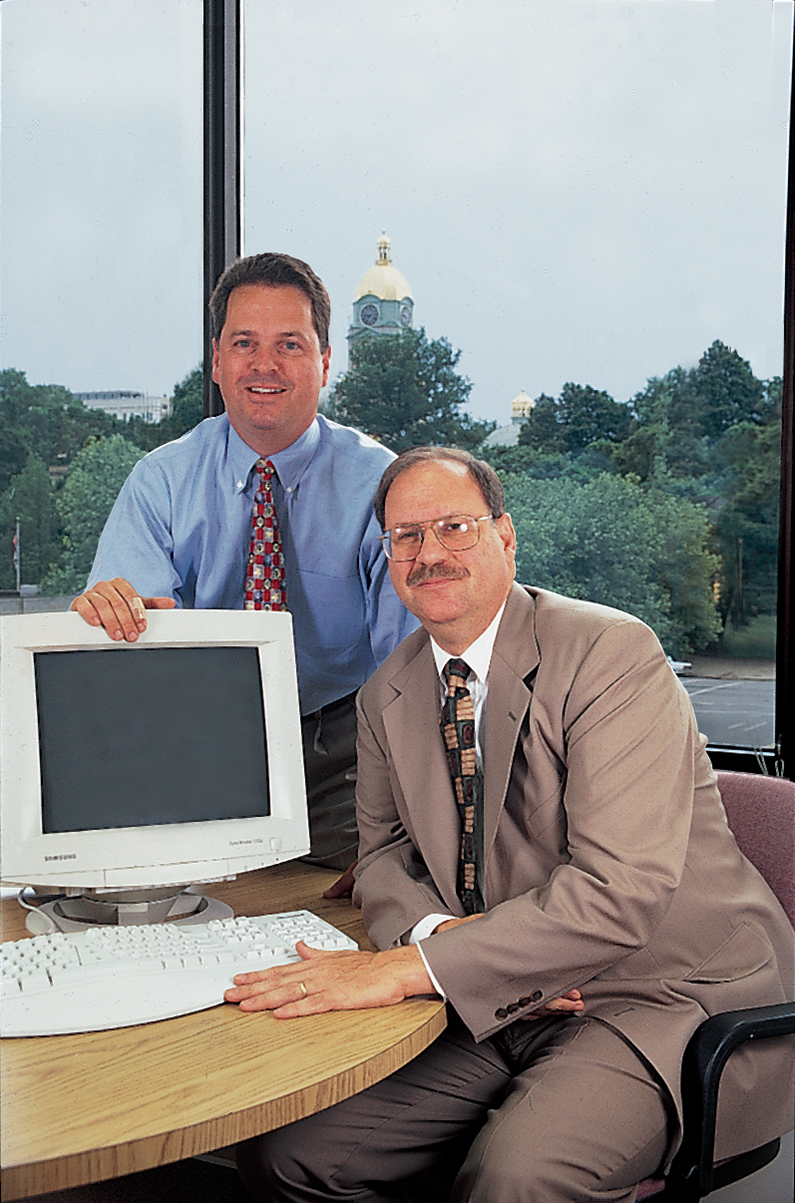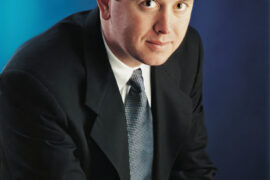A west coast flavor of doing business is working high tech wonders in downtown Huntington
By Dave Peyton
HQ 35 | SPRING 1999
The third floor of the modern office building at 611 Third Avenue in downtown Huntington is busy with people coming and going at all hours. Some are dressed in suits, others in jeans and T-shirts. One group at the office is engrossed in conversation, another is laughing and telling jokes. Computers, conference tables and whiteboards fill the offices except for the large area designated for ping pong. This setting is not about pretense. It’s about problem solving and the emphasis is not on outward appearance. And yet, even the sign that welcomes visitors says that what’s going on is strictly business.
In fact, that’s it’s name — Strictly Business, a homegrown venture that has the look and feel of the 21st Century about it with just a touch of west coast ambience.
It’s been around a decade and a half and it has made its mark in the region and around the world as a business that finds solutions to problems by using technology instead of allowing technology to use it.
Mike Owens, president, and Tom Pressman, vice president, began in the computer business by selling what they called “the box.” They were hardware salesmen, but in those days they offered, and the customers expected, long term support from the hardware vendors.
But Owens and Pressman knew the business of technology was going to change and they wanted to stay ahead of the game. They knew that hardware was only the beginning of the solution to most business problems. The application of software to the hardware was at the heart of making computer technology work.
“We decided to form the business for two compelling reasons,” Owens said. “First was the creation of Software Valley, a state organization formed to bring software development and 21st Century technology and jobs to West Virginia.
“That was something we knew we wanted to be a part of,” Owens said.
Then there was the clear signals in the mid-1980s that computers and the computing arts were going to become a major commodity in businesses throughout the world.
So, in a two-month period in 1985, the two put together the idea for Strictly Business. They still sold “boxes,” but their focus was more on selling computer packages — hardware and software — to solve problems for customers, Pressman said.
Many of those solutions involved computer networks. In fact, Owens says, Strictly Business was probably the first Novell Network dealer in the state.
The company had a “major brief involvement” with programming for the Department of Defense, Pressman said. But it was another major development in the world of computers that really gave Strictly Business a boost.
“The advent of cheaper platforms” brought these machines quickly to the forefront of business, industrial and governmental units, according to Thomas McChesney, Strictly Business vice president of business development.
The machines got better and cheaper. Companies that stayed in the primary business of selling hardware were losing out. It wasn’t hardware sales that made consulting businesses successful. It was the problem-solving capability of the company, no matter the brand of the hardware or software.
That’s why in 1994, Strictly Business got out of the business of selling hardware.
“We don’t really care what brand of computers our customers use these days and we are not vendors for any computer hardware,” Pressman said. Strictly Business gives its customers general guidelines for the kind of hardware the company thinks its customers need, but brand names are all but irrelevant.
Strictly Business sells a service, not a machine these days. But more than that, Pressman says, the company sells a “process” it has developed to help customers solve their problems. More likely than not, the solution involves technology, but sometimes it’s not the technology the customer expects.
Owens tells the story of one customer in West Virginia that needed to coordinate inventory several times a day between two warehouses separated by a few hundred miles.
“I went to visit them and they explained they thought they needed to get the computer systems at each of the warehouses communicating with each other. And that would be expensive since the computers didn’t speak the same language,” Owens said. “I listened to them and told them they didn’t need expensive software and a communications network. All they needed were two fax machines — one at each site — and an employee at each warehouse to fax information to the other site a few times a day. So, a solution that would have cost them a hundred thousand dollars cost them two fax machines and some employee time,” Owens said.
To Strictly Business, the process is as important as the solution.
“We communicate with the customer at every level of solving the problem,” Pressman said. “We coordinate among ourselves and our customers. We know that to make the customer satisfied in the end, the customer has to be satisfied throughout the process.”
The philosophy has worked well for Strictly Business. At any given time, the company is involved in solving problems for 30 or more customers. Its 50 employees do work for government agencies including the U.S. Army Corps of Engineers as well as NASA.
The NASA contract is particularly exciting for Strictly Business. They are involved in developing a payload planning system for the space station currently being constructed high above the earth.
“The equipment to build the space station must arrive in a certain sequence or else building the space station would be little more than chaos,” Pressman noted. “The software we are developing will make that part of the task easier.”
The company’s private sector customers outnumber its government customers. Some of the big companies Strictly Business has done work for include Addington Enterprises, Allied Signal, AT Massey Coal and Columbia Gas Transmission.
Strictly Business is a major source of computer training. The company believes that no matter how good the technology, the hardware or the software, if employees don’t know how to use it, it can be virtually worthless. Strictly Business has trained employees for American Electric Power, Bank One, Bell Atlantic, Kentucky Electric Steel, Marathon Ashland, Rockwell Automation and more.
The owners of Strictly Business count it as a blessing that the company is headquartered in Huntington. Because of the nature of the business, it really doesn’t matter where the business is located. The state of communications allows the company’s problem solvers to interact with customers around the world as easily as those around the block.
“The fact that we are located in Huntington has resulted in a nearly 100 percent employee retention rate. We hire people who want the atmosphere Huntington offers. It’s a great place to raise a family. It’s near the kinds of outdoor activities our employees want, including whitewater rafting and hiking,” Owens said.
“And if the predictions are true about the renaissance of small cities, Huntington is going to be one of the places that businesses such as ours will be looking at,” Pressman added.
The company focuses on keeping the best and the brightest the region has to offer and importing the best and the brightest who are attracted to the atmosphere Huntington provides.
In fact, they believe Huntington is part of their success and will remain so well into the 21st Century where Strictly Business, and all of us, are headed — ready or not.





